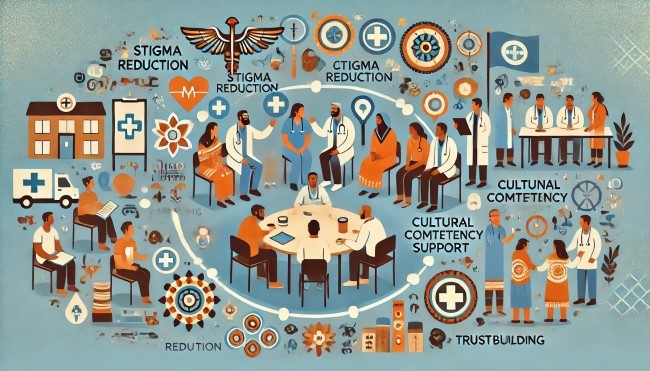The Influence and Barriers of Cultural Beliefs on Addiction Treatment

Cultural beliefs and practices can significantly influence how addiction is perceived and addressed within different communities. These cultural perspectives can create barriers to seeking and receiving effective addiction treatment. Understanding and addressing these cultural barriers is crucial for providing inclusive and effective addiction treatment that respects and incorporates diverse cultural values.
Cultural beliefs shape how individuals perceive addiction, their willingness to seek help, and the types of treatment they consider acceptable. These beliefs can either facilitate or hinder the process of seeking and receiving addiction treatment.
Stigma and Shame
In many cultures, addiction is viewed with significant stigma and shame. Substance use disorders are often seen as moral failings or weaknesses, leading to judgment and ostracism. This stigma can prevent individuals from acknowledging their addiction and seeking help. Fear of social consequences and damaging their family’s reputation can deter individuals from pursuing addiction treatment.
Traditional Healing Practices
Some cultures have strong traditions of using alternative or traditional healing practices to address health issues, including addiction. These practices may include herbal remedies, spiritual ceremonies, or consultations with traditional healers. While these methods can offer support, they may not always be sufficient on their own and can sometimes conflict with conventional medical approaches to addiction treatment.
Family and Community Dynamics
In many cultures, family and community play a central role in an individual’s life. The collective nature of these societies means that decisions about seeking addiction treatment are often influenced by family and community members. This can be a double-edged sword; strong family support can encourage treatment, but family pressure or fear of community judgment can also hinder it.
Barriers to Addiction Treatment
Cultural beliefs can create several barriers to accessing and engaging in addiction treatment. These barriers need to be understood and addressed to provide effective care.
Lack of Culturally Competent Care
One of the most significant barriers is the lack of culturally competent care. Healthcare providers may not be adequately trained to understand and respect the cultural backgrounds of their patients, leading to miscommunication, mistrust, and ineffective treatment. Without culturally sensitive approaches, patients may feel misunderstood and less inclined to engage in treatment.
Language Barriers
Language barriers can impede access to addiction treatment. Non-English speakers or those with limited proficiency may struggle to find providers who speak their language, understand treatment materials, or communicate effectively with healthcare professionals. This barrier can prevent individuals from seeking help or fully understanding their treatment options.
Fear of Legal and Immigration Consequences
In some communities, particularly among undocumented immigrants or those with uncertain legal status, fear of legal repercussions can prevent individuals from seeking addiction treatment. Concerns about deportation, legal action, or discrimination can create a significant barrier to accessing necessary care.
Mistrust of the Healthcare System
Historical and ongoing discrimination and mistreatment can lead to a deep-seated mistrust of the healthcare system among certain cultural groups. This mistrust can deter individuals from seeking addiction treatment, fearing that they will not receive fair or compassionate care.
Addressing Cultural Barriers to Treatment
To effectively address addiction in diverse cultural contexts, it is crucial to implement strategies that acknowledge and respect cultural beliefs while promoting access to effective treatment.
Culturally Competent Care
Healthcare providers must receive training in cultural competency to understand and respect the diverse backgrounds of their patients. This includes learning about different cultural beliefs and practices, understanding the social dynamics within these communities, and developing communication skills that are sensitive to cultural nuances. Culturally competent care builds trust and rapport, making patients more likely to engage in treatment.
Incorporating Traditional Practices
Where appropriate, integrating traditional healing practices with conventional addiction treatment can enhance the effectiveness of care. This approach respects the cultural background of the patient and can provide a more holistic treatment experience. Collaboration between traditional healers and medical professionals can create a comprehensive treatment plan that addresses the physical, mental, and spiritual aspects of addiction.
Community Engagement
Engaging with community leaders and organizations can help bridge the gap between healthcare providers and culturally diverse populations. Community leaders can act as advocates for addiction treatment, helping to reduce stigma and encourage individuals to seek help. Community-based programs can also provide education and resources tailored to the specific needs and beliefs of the community.
Language and Accessibility
Ensuring that addiction treatment services are accessible in multiple languages is crucial for overcoming language barriers. Providing translation services, multilingual treatment materials, and hiring bilingual staff can make a significant difference in the accessibility and effectiveness of treatment.
Building Trust
Building trust with culturally diverse communities requires consistent effort and commitment. Healthcare providers must demonstrate respect, understanding, and compassion in their interactions with patients. Transparency about treatment processes, patient rights, and confidentiality can help alleviate fears and build confidence in the healthcare system.



